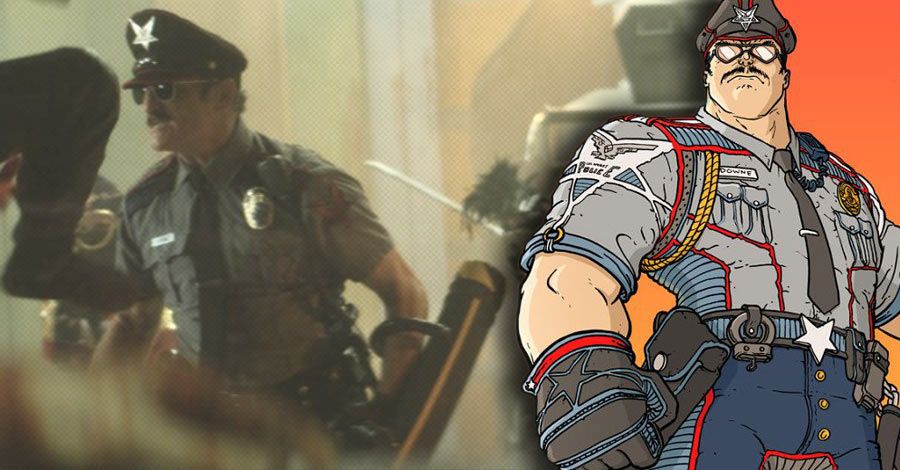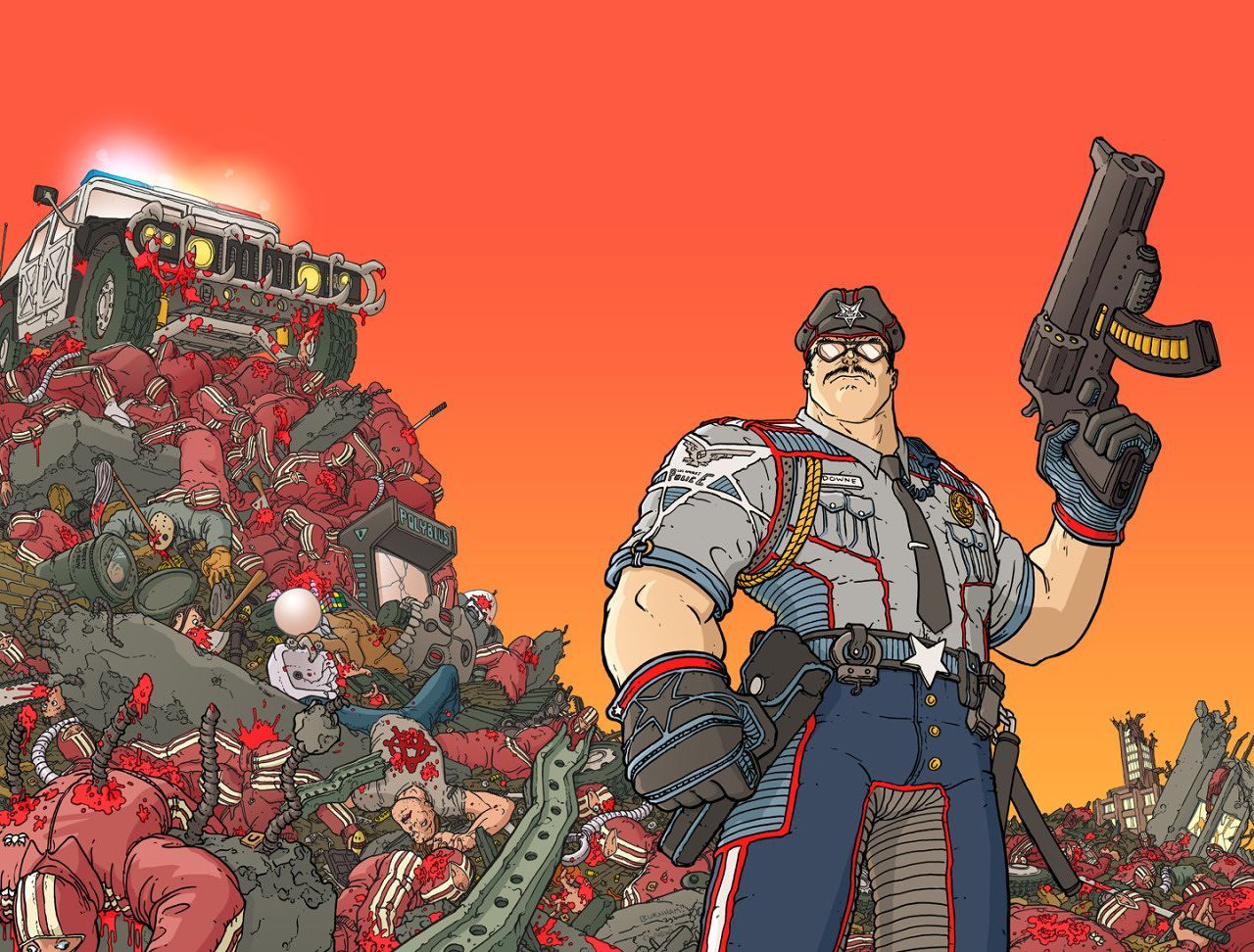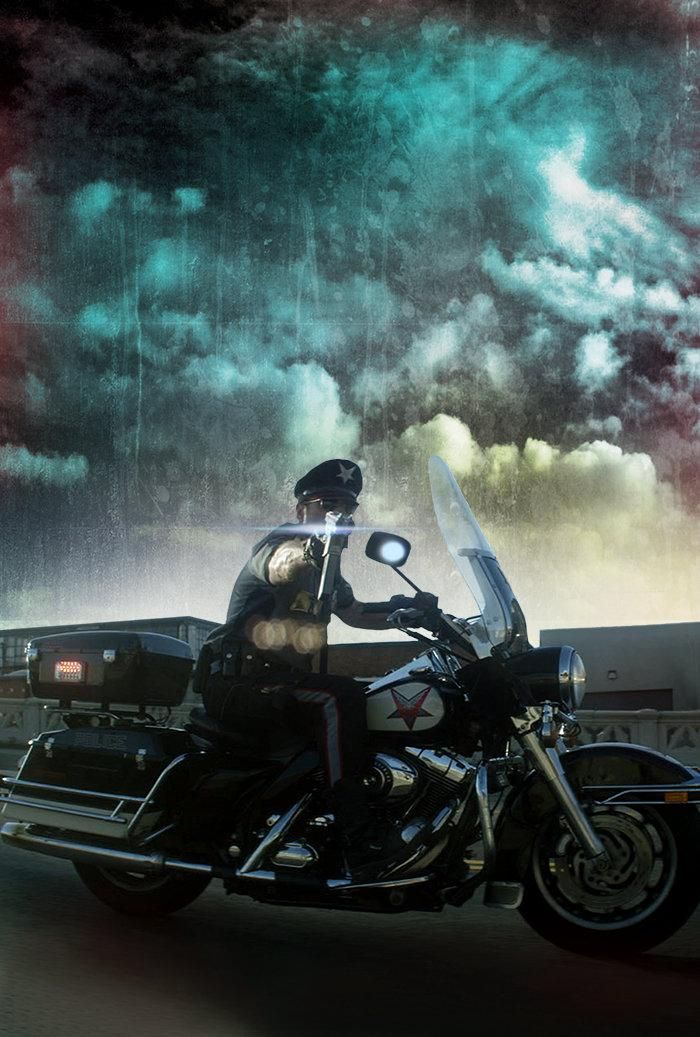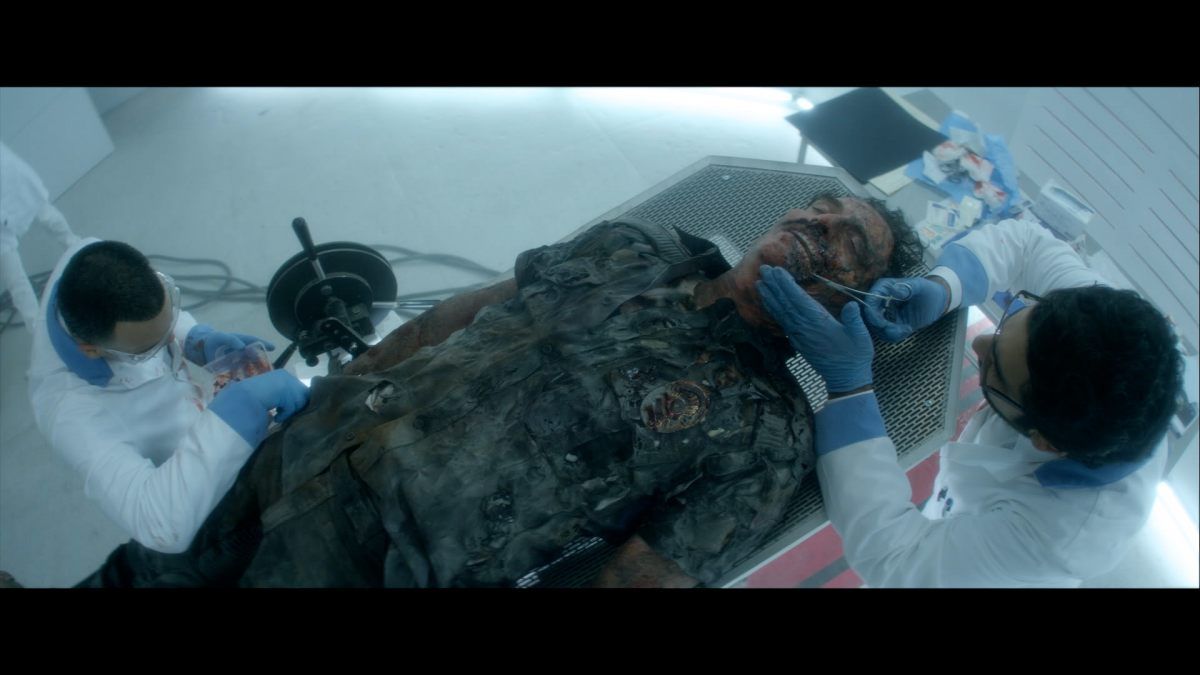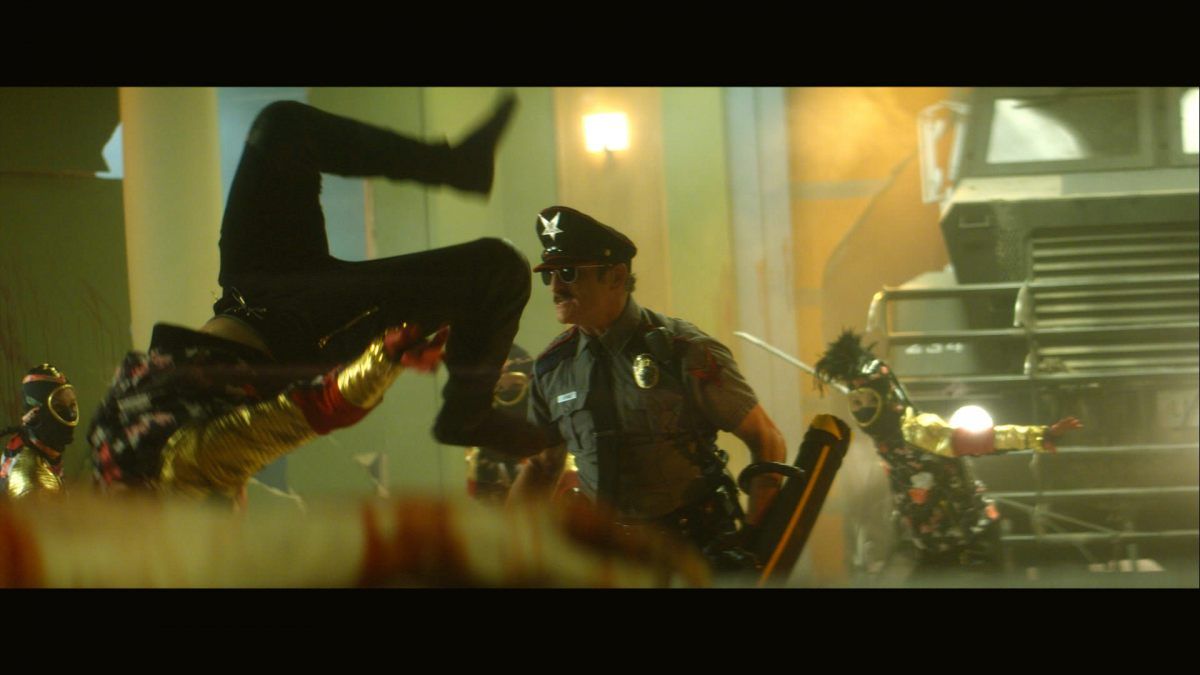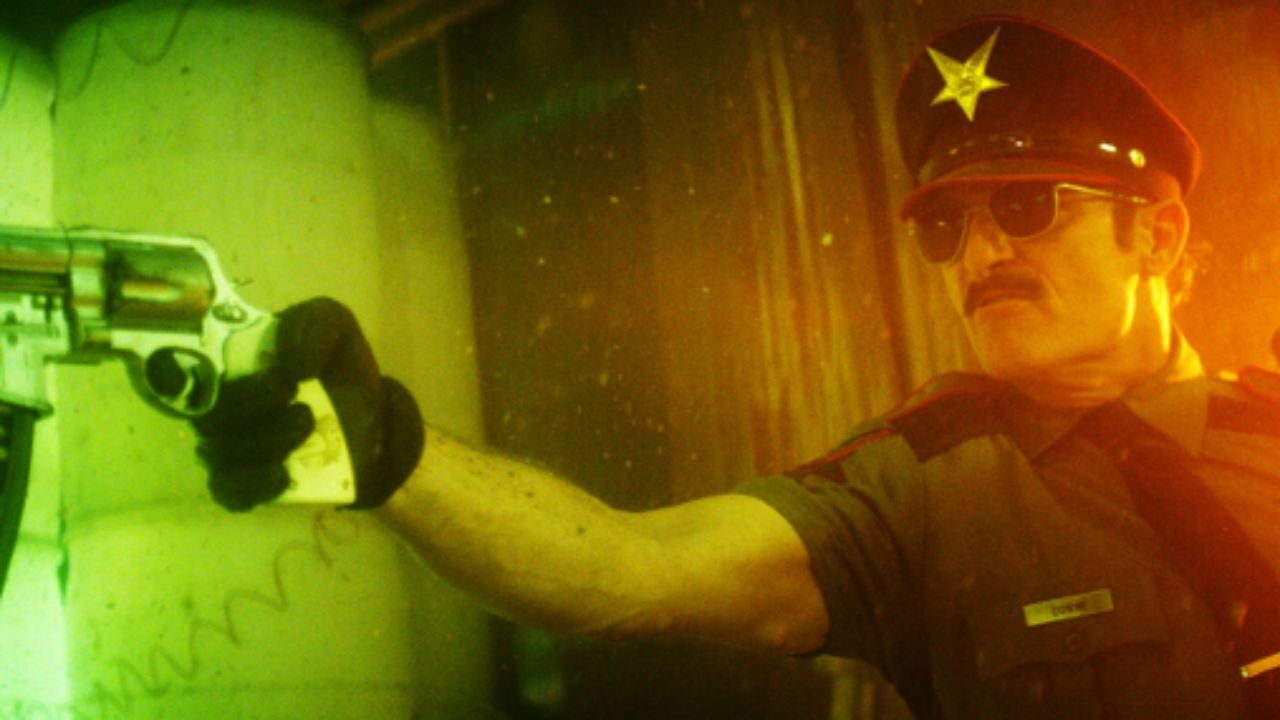Joe Casey and Chris Burnham's "Officer Downe" is not the kind of comic that's supposed to be made into a movie.
Released as a one-shot from the Man of Action imprint at Image Comics in 2010, the book tells the story of a square-jawed, ass-kicking cop who just so happens to be reincarnated every time he's killed on the job. "Officer Downe" is extremely violent, wildly sexual and doesn't present a fully fleshed-out narrative. In short, this is not the kind of story that major Hollywood studios are fighting each other to sign a deal for. But as Casey and Burnham explained to CBR News, those are exactly the reasons why their story will be lighting up the big screen this summer.
RELATED: "Officer Downe" Film Will Be 'Better Than Any Marvel or DC Movie,' Says Co-Director
Produced by Casey (who wrote the film's screenplay) alongside "Crank" masterminds Mark Neveldine and Skip Williamson and directed by Shawn Crahan (AKA "Clown" from metal outfit Slipkknot), the "Officer Downe" film stars "Sons of Anarchy" actor Kim Coates in the title role. The film makes its debut this weekend as part of the LA Film Festival (and tickets are still available).
With years of work behind the scenes almost in their rear view, the creators of the comic told CBR about how their head-splitting story went from four-color fantasy to silver screen reality, explain how Casey's screenplay completes the story with new depth for the beleaguered badass character and offer their take on the need for independent comic films to counteract the massive studio superhero pictures.
CBR News: Gents, I get the impression that the "Officer Downe" film came about a bit differently than we usually see these things happen. Typically there's a big announcement of an option being done and then many months or even years of waiting and then maybe a movie doesn't even come out. This seemed like a much more collaborative and direct process. What can you tell me about the origins of the film? Who first approached you about it and what did they see in the book and you in them that made this the right fit?
Joe Casey: It wasn't long after we put the hardcover version of the book out when Skip Williamson and Mark Neveldine got in touch with me about the feature rights -- which, of course, Burnham and I control 100% (thank you, Image Comics). These were the guys that made the "Crank" films, so this type of extreme, over-the-top kind of material was right in their wheelhouse. When I met with them, I'm not sure what they were expecting, but I had two specific demands. The first was obvious: I'd write the screenplay and be a producer on the film. The second was a little less obvious: I didn't want to go to a studio. I wanted to make this movie independently. Luckily, that's exactly how they wanted to do it, too. They didn't want to deal with a studio culture that would've probably resulted in a very sad, watered down version of the source material. They wanted to make an uncompromising, balls-to-the-wall film. So they didn't really "option" the material. I think that's a bullshit play. Instead, the three of us went in as equal producing partners and we were off to the races. I went off and wrote the script, and it wasn't long after when Clown signed on to direct. He told me he responded to the wild nature of the story, the characters, the concepts. He loved the comic book, the visuals, the blood, the sex. Creatively, the pieces all kind of fell together.
I've always felt like this character is a story and world the two of you always wanted to do more with, and from what I understand of the film, it's not just an adaptation of the action in the original one-shot. When it came time to decide what the film would be, what was the important thing to build the story around if not the balls-out beatdown of the original comic?
Casey: For me, the most important thing that emerged out of the feature version is the importance -- and the deeper nature -- of Officer Downe himself. What he's all about. What he represents in the story. The meaning of his existence. How his past affects his present. How he's seen by those around him. How he deals with his particular circumstances -- all that good character stuff. It's one thing to flesh out the world around him, but that doesn't mean jack-shit if the guy at the center of it all can't carry that world on his shoulders. So we all wanted to take that character a lot further than the comic book ever did. If I hadn't accomplished that in the script, I don't think an actor of Kim Coates' caliber would never have even considered taking the role. I gotta say, it was pretty goddamn gratifying when he signed on, because we knew right then and there that this vision of the character was going to work. And if you've read the comic book, Kim's performance has to be seen to be believed. He committed so fully to the role. Like I said, you just gotta see it.
Chris Burnham: The first time I met Kim he was in costume, minutes away from shooting his first scene as Officer Downe, and I freaked the fuck out. I was only vaguely aware of his career at that point when we cast him, so from my perspective it was like in "Weird Science" when Kelly LeBrock is created out a bunch of ripped up Playboys and emerges fully formed from the computer. Out of Kim's dressing room stepped Officer Downe! My mustache, my sunglasses, my costume, my semi-plausible double-barreled handgun, all there in three rock solid dimensions. Crazy. Joe and I created Kim Coates to star in "Officer Downe." "Sons of Anarchy," "Goon," "Last Boy Scout," etc. are all just timey-wimey side effects.
To look at each of your own contributions individually, I wanted to ask Joe about the process of writing the screenplay for this. Obviously this is the kind of gig that most comics writers want but rarely have a chance to do and actually see the final result made from their work. What did you learn in adapting your own work to another medium? Despite your extensive work writing for TV animation (and I'm sure scads of other projects we've never seen), was there a learning curve as you worked on this?
Casey: The first step in writing the screenplay was simply to translate the comic book story, just to get it down on the page. Everyone agreed that some radical re-think wasn't necessary. We wanted to put the comic book on the screen. So once I'd done that, I realized I only had half a movie. The comic book was almost like a rough sketch of a story (which I'm sure anyone who bought it can probably attest to). At the time, Burnham and I were more interested in mood and mayhem and merriment than anything else. But the film had to go deeper. I had to flesh out the characters, add more set pieces, make it more of a full story. I had to test the raw material that we'd created for the book. The weird thing is, the comic book might seem like a laugh -- and, believe me, Burnham and I had a good laugh making it -- but the bones were always there to tell a more emotional story. That's more of what the script became. Even Skip and Nev pushed me to dig further into the characters and mine the relationships, the conflicts, and the overall stakes in such a way that actors would have a lot more to sink their teeth into. And being on set every day, watching our cast go so incredibly balls-deep with their performances, was something I won't soon forget. Kim chewed the rag on the material to such a degree that, by doing so, he set the tone and the other actors fell right in line.
For Chris, I know that this comic was one of the best early platforms for your signature ability to deliver total weirdness and a ton of gory detail. In your experience watching the film come together, how much has director Shawn Crahan been able to capture a bit of your visual style and make the movie really feel like an adaptation of your work?
Burnham: Every day at the start of shooting, Shawn would walk into the middle of the set and an assistant would parade in and present him his copy of the "Officer Downe" HC, color coded Post-It notes sticking out every which way, like it was some sort of holy manuscript. Shawn would flip to the scene we were shooting that day, pause to reabsorb the material, and then he'd start pointing, moving the camera and crew around like a conductor -- almost like the Sorceror's Apprentice parting the waves -- as he walked everyone through the day. I was in a theater company in Chicago for eight years, and it's great fun to see how different people handle a room. And boy, Shawn has a presence. Dude is a refrigerator with a beard.
The entire production office was covered with blow-ups from the book, and almost everyone had a copy of it on their desk. Gerardo Madrazo, the cinematographer, told me that the book was the best storyboard he ever worked from. Maybe he was blowing smoke, but I choose to believe him! Anyhow, the book's omnipresence on set really shows. Watching the dailies on the monitor, it was clear that everyone involved was doing their damnedest to bring the comic to life as faithfully as possible. It's not a shot for shot adaptation like "Sin City," but the heart and soul is still there. And the digital color correction gives it the feel of Marc Letzmann's gonzo colors from the comic. Unlike, say, "Ant-Man," this is not a movie that feels the need to apologize for being based on a comic.
It seems one of the particular challenges of bringing this character to film is that some of the cornerstones of the original book (animal-headed mob bosses, teleporting hip-hop samurais, gangs out of "The Warriors") would be tough to do in live-action even with a massive budget. I know there are a lot of brand new characters in the movie, but how do they match the tone and feel of the original if not the exact world?
Casey: I think, even for anyone who thinks they know what a "comic book movie" is because they've watched the Marvel films are going to be in for a shock. Something like "Civil War" looks fucking tame compared to the weird ideas we've crammed into this thing. For the twisted souls who've already read the comic book, I can say with certainty that pretty much everything we put in the book ended up in the movie. From Headcase Harry to the Fortune 500 to Zen Master Flash and beyond, it's all in there. And yeah, I added some new characters -- not to mention an entire character sub-plot -- but I did it with an eye toward having it all fit together. Again, the best part about doing it outside of the studio system is that we didn't have any asshat executives trying to limit what we could do. As producers, we knew the budget, we knew what resources we had and we knew how to spend the money wisely, responsibly and creatively to get the most bang for the buck. We set out to establish a certain method -- a new kind of model -- for making these types of films, and I think we proved it beyond a shadow of a doubt.
Burnham: I'm not sure how close to the vest we're playing the new characters so I don't want to give too much away, but I did the initial sketches of the main new villain's costume, and on screen it's even more faithful than the Officer Downe costume is. She's really a sight to see.
From what I've heard from you both already, maybe the most exciting part of the entire film is Kim Coates in the lead role. Some of the publicity stills make him look like a Burnham drawing straight up. How does his performance bring the whole work together? And who else in the cast really seems to get what the Casey/Burnham creative juices are all about?
Casey: Don't get me started. First of all, we all owe Kim Coates for taking this on. It was the first gig he accepted after "Sons of Anarchy" ended, and he had plenty of offers. And although I'm not 100% sure, I believe it might be his first starring film role -- most certainly as the titular character of a film. And we all knew -- Kim included -- that if his performance didn't work, this film wouldn't work. But he took on the challenge like the pro he is, infusing the role with the kind of gravitas that a good actor can bring. He and I talked quite a bit early on about the script, the character, what he's all about. In a way, Kim forced me to think about Downe in ways I never had before -- and I co-created the goddamn guy! He had certain questions, and we found the answers together. And, like I said, he set the tone that the other actors followed. I thought they all did great, but I particularly loved seeing Reno Wilson and Bruno Gunn tearing it up in their roles (which, I should add, were created specifically for the film). I thought Reno in particular brought my dialogue to life in a way that completely exceeded my expectations (which were high to begin with, believe me). I mean, he fucking killed it. Luna Velez as Chief Berringer was a revelation, too. She brought a true humanity to that role. Hell, I could go on and on about the whole cast, really, but I'm starting to make myself sick here.
Burnham: Kim Coates is absolutely amazing. I thought of the Officer Downe comic as a nearly mindless exercise in adolescent nihilism, but he's somehow found a real depth to it that ties it all together and somehow makes it feel significant while still keeping true to its yee-haw roots. He's a Michelin Star chef preparing a dinner of Doritos and Starburst.
And I was really knocked out by Tyler Ross, who nails "aw shucks gee whiz" quality that Officer Gable had in the comic but with a hidden reservoir of badassery.
The original comic often refers to Downe -- a totally brutal force of nature if there ever was one -- as "the perfect cop." That kind of satire of the culture around police brutality seems almost prophetic for the society we live in today. How much has the current debate over excessive force bled into what this movie is doing?
Casey: I get what you're saying about the satire of it all. It's definitely there to some degree. But there's also an inherent dichotomy to the concept that's just part of my own creative DNA, in terms of the stuff I grew up on. As a matter of fact, there's a specific correlation between "Officer Downe" and, for example, Frank Miller's "Dark Knight Returns" (the original from '86). That book offered up plenty of biting satire of 1980s America and even of superheroes in general, but that doesn't mean that Miller's Batman didn't have a rock solid moral center. The character was a force of nature, beyond its genre trappings. Same thing with early "Judge Dredd." A similar thing applies to "Officer Downe." I think both ideas can happily coexist if the work ultimately delivers. In terms of the completely outrageous and actionable behavior -- on the part of certain real-life cops -- being much more visible in the news lately (and deservedly so, because that kind of shit cannot be tolerated in a civilized society), I have to admit it was something that I thought about while we were shooting last year. I knew we were dealing with iconography that was a lot more volatile than it has been in quite a while. But, ultimately, you have to move past all of that. This is a piece of entertainment. It's not meant to be a heavy social statement. It's a popcorn movie ride and shouldn't be mistaken as anything more than that.
Burnham: I think the question was about "Axe Cop," yes? Well, "Axe Cop" exploded onto the internet when we were about halfway finished with the "Officer Downe" one-shot. Joe thought I should go back and redraw the pages to shave his mustache and give him an eyepatch and a ponytail, but I managed to talk him off that ledge -- there's room enough in pop culture for two badassed, sunglassed police officers. We barreled through, and it worked out for everyone involved. Anyhow, I hear Kim Coates used to give Nick Offerman wedgies when they were in high school.
Now that you've been able to make your own movie on your own terms, how has your opinion of "comic book Hollywood" changed? I mean, we all know that the big corporations that control Marvel and DC are going to keep doing what they do for a billion years at this point, but do you think there are going to be more opportunities for flicks like "Officer Downe" to challenge the public perception of what a comic book movie can be? What do you wish for more of in that entertainment space, as creators or audience members?
Casey: Well, I sure as hell hope there's more opportunities, because we're not done yet. I mean, we're done with this movie, but there are more of these to make. But believe me, it took a lot to get this one on film. A lot of hard work and a lot of inexplicable, unrepeatable luck. The fact is, something that exists fully in an independent space is going to be a lot more of a high-wire act than any studio-based, focus-tested, toy-selling product that's ultimately just one component of a larger corporate synergy. It's apples and oranges, as far as I'm concerned. But, y'know, that's just my knee-jerk, anti-corporate side coming out. Honestly, I'm still flying high on the fact that we actually made the damn thing! I'm not sure if I have any more perspective on it than that right now. I mean, we just finished the movie. Just a week ago, Nev and I were on the dub stage, working on the final sound mix. So at this point, all of my energy is aimed specifically toward seeing it premiere at the LA Film Festival on June 3. As for the perceptions involved, I'd like to think it's just another step on a path that's already been worn by films like the first "Sin City" and the first "Kick-Ass." And like I said, we went into this thing hoping to prove that our model for making this kind of high-concept, high-octane movie could work. And we have. So on one level, I wouldn't be surprised if we saw more films like this, made in this way. But then, that all depends whether or not anyone else has the balls to take up the challenge. I know we're all chomping at the bit to make the next one, because we know exactly how to do it now.
Burnham: I love the Marvel and DC movies, but there's a certain inherent predictability to them, even with something as bonkers as "Batman v Superman." Personally, I think Zack Snyder should do an adaptation of "Marshal Law," which would really give him the excuse to drag superheroes through the mud! If you've got 200 million dollars lying around, you could make "Avengers 3" or you could make 50 "Officer Downes." I know which option I'd pick!
Finally, with the movie ready to roll, is there any chance you'll come back and do more with Terry Downe in print?
Casey: I'd definitely consider it, but then again, I don't have to draw the goddamn thing.
Burnham: I'm Downe.
"Officer Downe" debuts this weekend at the LA Film Festival.

